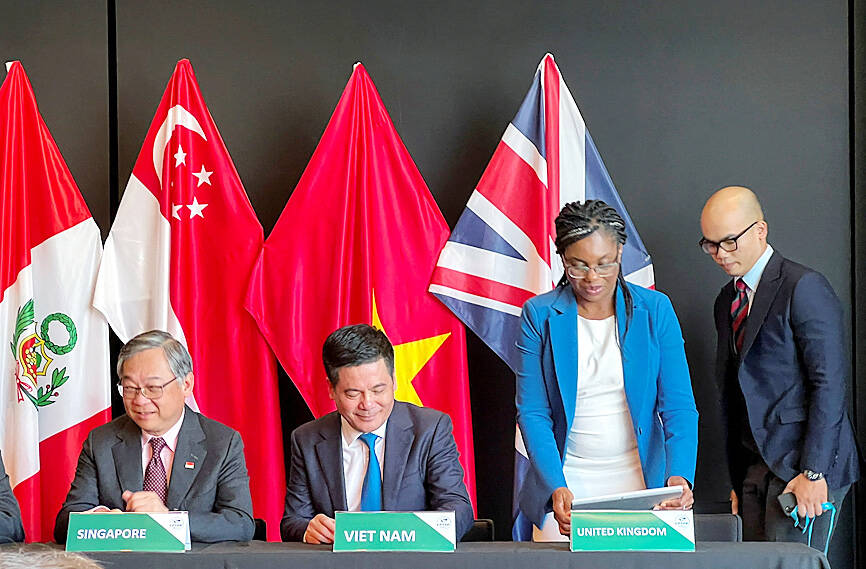Members of a major trans-Pacific trade pact yesterday said they were gathering information on Taiwan, China and other countries interested in joining the agreement to see whether they were able to meet the pact’s “high standards.”
The comments followed the Comprehensive and Progressive Agreement for Trans-Pacific Partnership (CPTPP) meeting in Auckland where the UK formally signed the treaty to become a member, and a decision to review and update the agreement was also made.
Along with Taiwan and China, Costa Rica, Ecuador, Ukraine and Uruguay have also applied to join the pact. A decision on which country can join and when would be made collectively.

Photo: Reuters
“The membership is currently undertaking an information-gathering process on whether aspirant economies can meet the CPTPP’s high standards, taking into account their experience on their trade commitments,” the members said in a joint statement.
The CPTPP is a landmark trade pact agreed in 2018 between 11 countries including Australia, Brunei, Canada, Chile, Japan, Malaysia, Mexico, New Zealand, Peru, Singapore and Vietnam.
The UK became the 12th member of the pact, which cuts trade barriers, as it looks to deepen ties in the Pacific after its exit from the EU in 2020.
“We continue to discuss how to move forward collectively on accession processes in a way that reflects all our interests and maintains the high standards,” the CPTPP statement said.
China’s application to join the pact is next in line if they are dealt with in the order they were received, but the country faces a number of hurdles to be included.
The CPTPP requires countries to eliminate or significantly reduce tariffs, make strong commitments to opening services and investment markets and has rules around competition, intellectual property rights and protections for foreign companies.
New Zealand Minister for Trade and Export Growth Damien O’Connor, who chaired the CPTPP meeting, told a news conference that there was no timeframe for when any decisions on future membership would be made.
“It’s a complex area,” O’Connor said of membership applications, adding no single country’s application was discussed on Sunday.
China has opposed Taiwan’s application, which is to be reviewed after Beijing’s.
Earlier in the day, the UK signed the treaty to accede into the pact, although it still needs to be ratified by the country’s government.
British Secretary of State for Business and Trade Kemi Badenoch said at the signing that her country was delighted to become the first new member of the CPTPP.
“This is a modern and ambitious agreement and our membership in this exciting, brilliant and forward-looking bloc is proof that the UK’s doors are open for business,” Badenoch said.

AT RISK: The council reiterated that people should seriously consider the necessity of visiting China, after Beijing passed 22 guidelines to punish ‘die-hard’ separatists The Mainland Affairs Council (MAC) has since Jan. 1 last year received 65 petitions regarding Taiwanese who were interrogated or detained in China, MAC Minister Chiu Chui-cheng (邱垂正) said yesterday. Fifty-two either went missing or had their personal freedoms restricted, with some put in criminal detention, while 13 were interrogated and temporarily detained, he said in a radio interview. On June 21 last year, China announced 22 guidelines to punish “die-hard Taiwanese independence separatists,” allowing Chinese courts to try people in absentia. The guidelines are uncivilized and inhumane, allowing Beijing to seize assets and issue the death penalty, with no regard for potential

STILL COMMITTED: The US opposes any forced change to the ‘status quo’ in the Strait, but also does not seek conflict, US Secretary of State Marco Rubio said US President Donald Trump’s administration released US$5.3 billion in previously frozen foreign aid, including US$870 million in security exemptions for programs in Taiwan, a list of exemptions reviewed by Reuters showed. Trump ordered a 90-day pause on foreign aid shortly after taking office on Jan. 20, halting funding for everything from programs that fight starvation and deadly diseases to providing shelters for millions of displaced people across the globe. US Secretary of State Marco Rubio, who has said that all foreign assistance must align with Trump’s “America First” priorities, issued waivers late last month on military aid to Israel and Egypt, the

‘UNITED FRONT’ FRONTS: Barring contact with Huaqiao and Jinan universities is needed to stop China targeting Taiwanese students, the education minister said Taiwan has blacklisted two Chinese universities from conducting academic exchange programs in the nation after reports that the institutes are arms of Beijing’s United Front Work Department, Minister of Education Cheng Ying-yao (鄭英耀) said in an exclusive interview with the Chinese-language Liberty Times (the Taipei Times’ sister paper) published yesterday. China’s Huaqiao University in Xiamen and Quanzhou, as well as Jinan University in Guangzhou, which have 600 and 1,500 Taiwanese on their rolls respectively, are under direct control of the Chinese government’s political warfare branch, Cheng said, citing reports by national security officials. A comprehensive ban on Taiwanese institutions collaborating or

France’s nuclear-powered aircraft carrier and accompanying warships were in the Philippines yesterday after holding combat drills with Philippine forces in the disputed South China Sea in a show of firepower that would likely antagonize China. The Charles de Gaulle on Friday docked at Subic Bay, a former US naval base northwest of Manila, for a break after more than two months of deployment in the Indo-Pacific region. The French carrier engaged with security allies for contingency readiness and to promote regional security, including with Philippine forces, navy ships and fighter jets. They held anti-submarine warfare drills and aerial combat training on Friday in